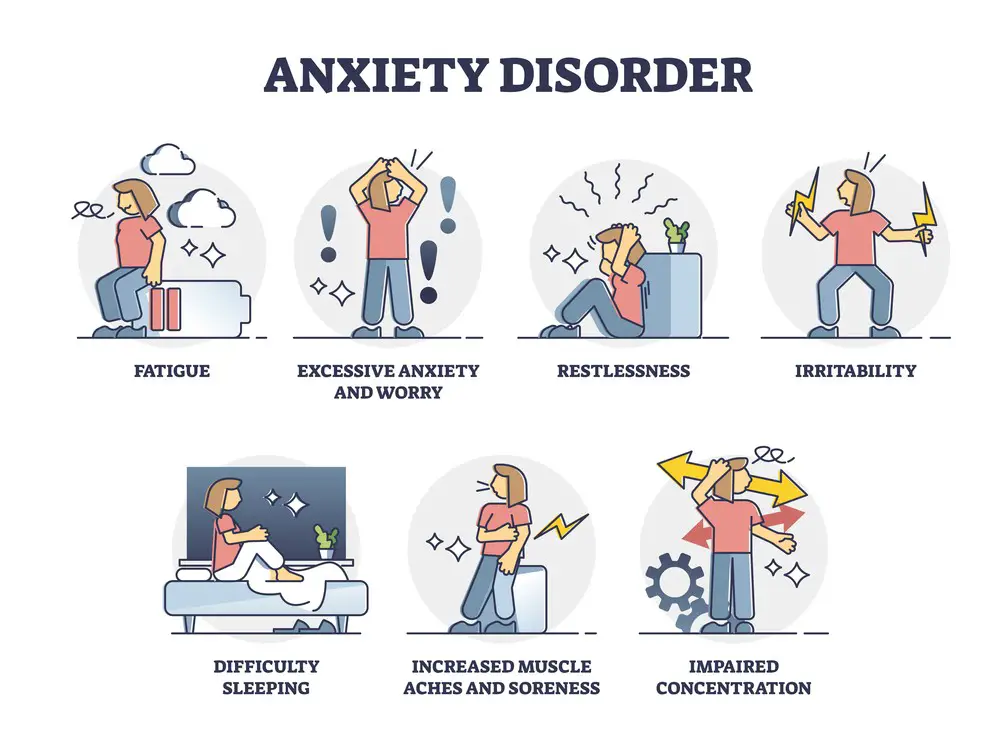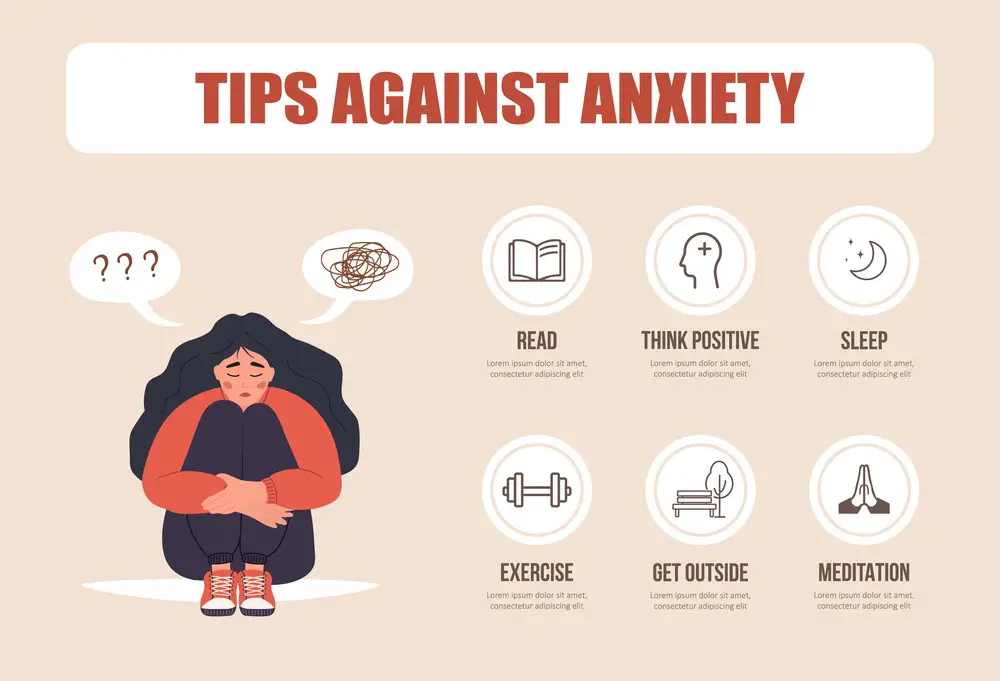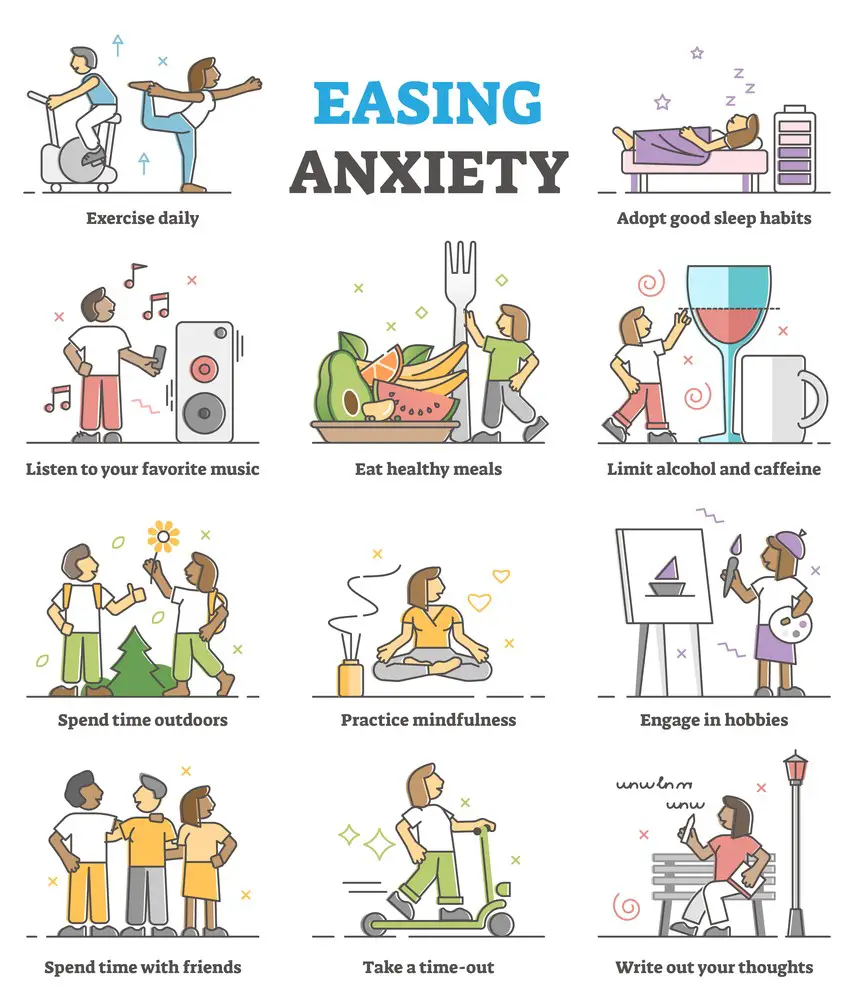Anxiety attacks are different from panic attacks, even though they both have similar symptoms. The difference between the two is that panic attacks can occur in the absence of or with a trigger, whereas a perceived danger triggers anxiety attacks.
Medical News Today informs us that the symptoms of both anxiety and panic attacks may include shallow breathing, rapid heart rate, and a feeling of distress. However, there are some differences. Even though panic attacks typically appear suddenly and subside after a few minutes, feelings of anxiety build up gradually, and symptoms may prevail for longer.
Differing levels of anxiety are typical, but in some cases where it’s very intense, it causes anxiety disorder, often resulting in anxiety attacks. Since over 30% of Americans experience various levels of anxiety disorder, you may have an interest in knowing how long do anxiety attacks last.
 Understanding Anxiety Attack Duration
Understanding Anxiety Attack Duration
Usually, anxiety attacks can last from a few minutes to half an hour. Anxiety attacks tend to peak at about ten minutes. However, the perceived duration may feel longer because time is dragging on during those moments.
Sometimes, people with generalized anxiety disorder may feel that the anxiety attack lasts for days. During this time, they feel a high level of anxiety, but the attack doesn’t last that long. However, they may have back-to-back anxiety attacks, leading to them feeling that they are having a long episode.
Factors Influencing Anxiety Attack Length
Several causes can trigger anxiety symptoms, leading to a fight-or-flight response that warns the body of a potential threat and leads it to try and get away from it. During a threat, the body releases hormones, like adrenaline, to help you quickly respond to the threat.
Usually, the fight-or-flight response gets triggered during a life-threatening situation. Still, more minor, non-life-threatening situations can also trigger it in some people, like writing an exam, running late for work because of a traffic jam, etc. In some people, the length of the attack may persist or come in waves because their stress response can’t shut down.
Here are some factors that can help answer the question of how long do anxiety attacks last:
Trigger Severity – The stressor intensity that initiated the anxiety attack can impact its duration, and the more severe or distressing the trigger can also lead to a longer-lasting episode.
Individual Sensitivity – Physiological and psychological circumstances can lead to shorter or longer anxiety attacks, depending on the person’s sensitivity to triggers.
Coping Mechanisms – Some people have a better coping mechanism, allowing them to implement coping strategies to manage anxiety attacks and reduce their length more effectively.
Environmental Factors – The environment where the anxiety attack occurs can also affect the duration of an anxiety attack. When they are in a stressful environment, the symptoms may be more prolonged than in a supportive or calming environment. A supportive environment may include having friends, family, or a health professional present to whom the person can talk.
Past Experiences -Individuals who have managed to cope with an anxiety attack successfully previously may manage to curb the duration of an episode.
Mindfulness and Relaxation – Meditation and deep breathing can help shorten the duration of an anxiety attack.
Medical Conditions – People with underlying health issues or those taking certain medications may find that they have more prolonged and more intense anxiety attacks. Individuals who are undergoing counseling or therapy and following a treatment plan may often experience shorter and less severe anxiety attacks over time because they receive personalized guidance, support, and medications if required.
 Typical Duration of Anxiety Attacks
Typical Duration of Anxiety Attacks
How long do anxiety attacks last? According to Rapid Care Emergency, no specific timeframe exists for anxiety attacks because several factors can lead to them lasting for shorter or longer periods. Some individuals may experience them for a few minutes while others for hours. Then again, they can even last for some days in others.
They recommend individuals keep a timer of at least three episodes to have a good idea of the length of their symptoms. To help treat the symptoms and prevent them in the future, it’s also important to note the factors contributing to the anxiety. However, it’s worth knowing that even one individual can have different anxiety attack episode durations.
Similarly, the recovery process differs between individuals. Furthermore, some people may never have more than one anxiety attack, requiring no further treatment. In contrast, others will need to see a mental health professional to help them control their anxiety.
Short vs. Prolonged Anxiety Attacks
Knowing how long do anxiety attacks last can help you better cope with episodes. Let’s compare short vs. prolonged anxiety attacks:
Short Anxiety Attacks
- Short anxiety attacks typically last from a few seconds up to 15 minutes. In most cases, they are also less frequent.
- They can be intense but not as severe as longer episodes.
- Usually, the triggers for short anxiety attacks are specific stressors, situations, or thoughts.
- Typically, individuals experiencing short anxiety attacks recover relatively quickly once there’s a resolution of the situation or the removal of the trigger.
- If an individual can learn to manage short anxiety attacks, they may have a minor effect on their daily function and lives.
- Short anxiety attacks are often easier to manage with self-help strategies, relaxation techniques, and lifestyle changes.
Long Anxiety Attacks
- Long anxiety attacks will last longer than 20 minutes, often lasting for hours and, in some cases, for days. In some cases, they can occur more frequently, leading to prolonged periods of heightened anxiety.
- Over longer periods, the intensity of symptoms can be more severe, significantly impacting the person’s daily functioning.
- It appears that the triggers are more persistent or chronic stressors. However, they can also include underlying mental health conditions or a combination of factors.
- It may take longer to recover from more prolonged anxiety attacks, requiring additional support. These may include professional intervention, learning coping strategies, and having a supportive environment.
- Long anxiety attacks can significantly disrupt daily activities, relationships, and overall well-being since they can interfere with work, social interactions, and carrying out regular tasks.
- Long anxiety attacks mostly require more comprehensive treatment, including psychotherapy, medication, or a combination.
Individuals experiencing anxiety attacks need to seek professional help, especially if the attacks are frequent, severe, or significantly impacting their quality of life. Mental health professionals will conduct an assessment. After diagnosing the anxiety disorder, they will create a tailored action plan for your anxiety to address the causes and symptoms.
 Strategies to Cope with Lengthy Anxiety Attacks
Strategies to Cope with Lengthy Anxiety Attacks
The causes of an anxiety attack may differ for each individual, as will its length, but here are some strategies to cope with lengthy attacks.
Deep Breathing Exercises and Relaxation – Deep breathing and muscle relaxation exercises will slow your breathing and calm you. Breathing automatically becomes shallower during the fight or flight response. Breathing techniques help you focus on deeper and slower breaths, allowing you to regain control of your breathing—one of the best mechanisms to help you regain control in both short and lengthy anxiety attacks.
Mindfulness and Muscle Relaxation– Ground yourself by focusing on the present through mindfulness meditation to redirect your attention away from the cause of your anxiety. Steadily tense and then relax different muscle groups in your body to help release anxiety-related physical tension. Focus on your body sensations to encourage mindfulness in the present moment by paying attention to the physical sensations of your breathing.
Positive Affirmations – Constantly repeat positive affirmation phrases to help counter the negative thoughts that encourage your feelings of anxiety. Repeating a mantra, like “I have calmed down because I am safe,” meditating or praying can help create positive affirmations.
Rationalization and Self-Talk – Challenge and reframe any irrational thoughts, helping remind yourself that anxiety attacks, while distressing, are temporary and not life-threatening. Look at your surroundings; if you aren’t in danger, you don’t need to get yourself to safety. Concentrate your thoughts on one item in your surroundings to regain your thoughts and state of mind from before the attack.
Create a Safe Space -Identify a physical or mental safe space that brings comfort. Use this space as a refuge during anxiety attacks.
Pursue Social Support – Reach out to someone you have identified as someone who can assist you during your anxiety attack, like a trusted friend, family member, or support person.
Use Distraction Techniques – Engage in activities that divert your attention from anxious thoughts. These differ from person to person but often include listening to music, reading, watching a favorite show, participating in your favorite exercise, practicing a hobby, etc.
Movement– Some people find that moving helps them relieve anxiety quickly because their energy gets shifted from the mind to the body.
Professional Intervention – Various types of therapy will provide you with further coping strategies for lengthy anxiety attacks. Some therapies that provide anxiety management techniques include cognitive behavioral and dialectic behavior therapies.
Medication – In some cases, your mental health therapist may deem it necessary to consult with a healthcare professional for medication to help you manage the symptoms of anxiety.
 Seeking Support for Extended Anxiety Episodes
Seeking Support for Extended Anxiety Episodes
There’s no need to suffer extended anxiety episodes and other anxiety symptoms alone. Anxiety is manageable through treatment plans that can reduce the extent of the episodes and the symptoms.
Anxious thoughts and feelings during extended anxiety episodes can also increase the risk of other health complications. Therefore, a customized health plan from a physician and mental health professional will provide support and prevention.
Seeking support will ensure you have no underlying health issues causing the anxiety. Sessions with a therapist will help you learn how to avoid triggers, calm yourself, and manage extended anxiety episodes best.
Seeking support for extended anxiety episodes will help you find ways to manage, allowing you to live your life to the fullest.
Tips for Reducing Anxiety Attack Duration
How long do anxiety attacks last can also depend on the steps you take to prevent them from happening. Minimizing anxiety triggers is one of the best ways to reduce the duration of anxiety attacks. However, you can also take care of yourself in the following ways to help reduce their duration:
Stress Relief – Some of the best ways to lower your stress and help reduce the duration of anxiety attacks are deep breathing, meditation, tai chi, massage, and mindfulness.
Exercise – Making time for a regular exercise routine helps keep you fit and is one of the best stress reducers.
Eliminate Triggers – For many people, coffee, smoking, alcohol, and some drugs are stress triggers. Therefore, it’s best to avoid them.
Get Enough Sleep – Sleep is one of the best ways to repair the body from the effects of stress and makes it easier to manage stress. Therefore, make sure you get your eight-hour nightly rest.
Staying Connected – Studies continue to prove the importance of having a social life on our physical and mental well-being. Instead of relying on social media (known for triggering anxiety in some people) instead, make a point of meeting up with friends instead.
Get Treatment – Your health care and mental health professionals have the means to reduce an anxiety attack through medication or therapy. Get their advice for the best treatment.
 Professional Help for Long-lasting Anxiety Attacks
Professional Help for Long-lasting Anxiety Attacks
All humans have some form of anxiety. However, if it has become something that occurs frequently or disrupts your life, then you should seek support and ways to manage your symptoms.
Anxiety attacks feel terrible, and they aren’t good for you. You should seek professional help if you have frequent or long-lasting anxiety attacks. However, first, consult a medical professional to rule out other causes of your anxiety. If you are diagnosed with an anxiety disorder, a mental health therapist is the best person to help you find the triggers and manage the symptoms. Once armed with all the coping skills, it is easy to regain the calm you deserve in any situation.
When to Seek Counseling
- Frequency and Disruption: Seek help if anxiety attacks are frequent or severely disrupt your daily life.
- Physical Health Check: Initially, consult a medical professional to exclude other medical causes for your anxiety.
- Professional Diagnosis: If diagnosed with an anxiety disorder, a mental health professional can provide the most effective support.
- Understanding Triggers: Therapists help in identifying specific triggers of your anxiety attacks.
- Managing Symptoms: Learn coping strategies to manage symptoms effectively.
- Regaining Calm: With the right skills, you can regain a sense of calm in various situations.
Remember, recognizing the need for help is a crucial first step toward better mental health. Seeking professional guidance is not a sign of weakness but a step towards empowerment and well-being.
 Maximizing Benefits from Counseling: Setting Goals and Recognizing Progress
Maximizing Benefits from Counseling: Setting Goals and Recognizing Progress
- Define Clear Objectives: Consider what you want to achieve before beginning counseling. Setting clear goals helps both you and your therapist focus on specific areas.
- Open Communication: Be open and honest with your therapist. The more they know, the better they can help.
- Active Participation: Engage actively in sessions and any homework or activities suggested by your therapist.
- Track Your Progress: Keep a journal to note your feelings or behavior changes. This helps in recognizing improvements and areas needing more work.
- Celebrate Small Wins: Acknowledge and celebrate even the slightest progress. It’s a journey, and every step counts.
- Adjust Goals as Needed: As you progress, your goals might change. Discuss these changes with your therapist to stay on track.
- Seek Feedback: Regularly ask for feedback from your therapist about your progress and areas for improvement.
- Patience is Key: Remember, change takes time. Be patient with yourself and the process.
Engaging in therapy is a commendable step towards personal growth. By setting clear goals, actively participating, and recognizing your progress, you can make the most out of your counseling experience.
- New Florida Law Cracks Down on Misuse of Emotional Support Animals - February 12, 2024
- The Stress-Free Path to Mastering Conversations: Essential Techniques Unveiled - February 12, 2024
- The Burnout Epidemic: Why We’re All Feeling Overwhelmed and How to Cope - February 9, 2024
This site contains affiliate links to products. We will receive a commission for purchases made through these links.


 Understanding Anxiety Attack Duration
Understanding Anxiety Attack Duration Typical Duration of Anxiety Attacks
Typical Duration of Anxiety Attacks Strategies to Cope with Lengthy Anxiety Attacks
Strategies to Cope with Lengthy Anxiety Attacks Seeking Support for Extended Anxiety Episodes
Seeking Support for Extended Anxiety Episodes Professional Help for Long-lasting Anxiety Attacks
Professional Help for Long-lasting Anxiety Attacks Maximizing Benefits from Counseling: Setting Goals and Recognizing Progress
Maximizing Benefits from Counseling: Setting Goals and Recognizing Progress

